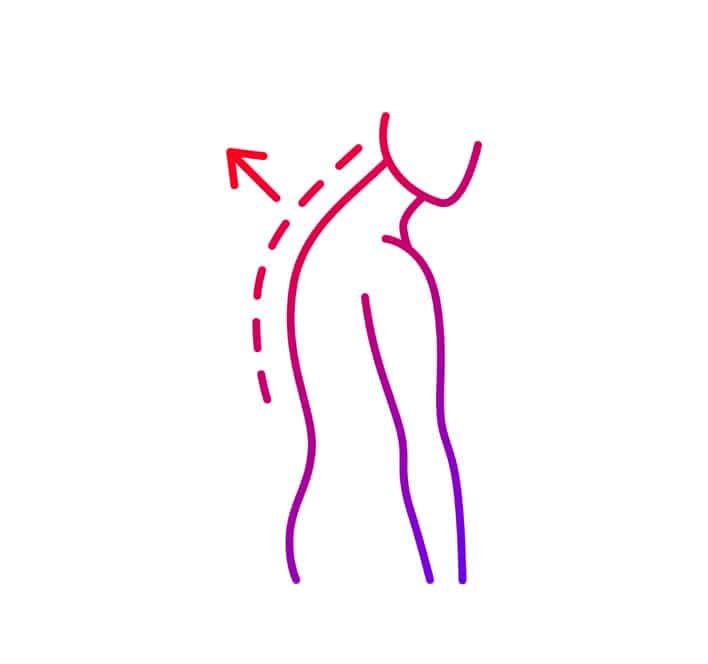Your thoracic spine has a standard curve, as your cervical and lumbar spines do. These curves provide optimum movement flexibility and weight distribution. However, when conditions cause the thoracic spine to deform, a disorder called kyphosis, painful and uncomfortable symptoms may be present. The conditions that contribute to the misalignment of the spine determine what type of kyphosis doctors are dealing with.
Your orthopedic kyphosis specialist will be able to tell what type of kyphosis you are experiencing and apply the appropriate treatments that will prevent or alleviate symptoms related to kyphosis. Treatments such as braces, physical therapy, and even surgery may relieve your symptoms and regain your quality of life. Our team at NJ Spine & Orthopedic can help.
4 Common Types of Kyphosis
Some of the most common types of kyphosis to be aware of include:
Postural Kyphosis
Poor posture can cause the thoracic spine to curve outward, causing a rounded or hunched back. Postural kyphosis is most common in adolescents and young adults, as they may slouch while standing or sitting while their spines grow.
Our spine experts can take X-rays to determine if any vertebral abnormalities or spinal structural damage are contributing to the kyphosis condition. If there are no indications of abnormalities or structural damage, we can stop or slow down further deformation through education about proper posture while sitting or standing. Otherwise, further treatment may be needed.
Degenerative Kyphosis
While postural kyphosis mainly affects teens and young adults, degenerative kyphosis primarily affects older adults. As the body ages, bones and discs in the spine deteriorate due to normal wear and tear. When discs degenerate, these degenerative conditions can lead to gradual kyphosis over time.
Medications, exercise, and braces that help support the spine are viable methods to treat degenerative kyphosis. If the degenerative kyphosis is caused by osteoporosis, which makes the vertebrae bones brittle and causes degenerative disc disease, changes to your lifestyle in terms of exercise and diet may slow the progression of degenerative kyphosis. Sometimes, surgery is required when kyphosis is severe.
Congenital Kyphosis
This type of kyphosis is developed from structural and functional abnormalities that occur while the fetus is formed in the womb or during birth. Spina bifida is an example of a disorder that can cause kyphosis. This can cause the spine to be unsupported in the thoracic area, weakening the spine and forming a congenital kyphosis condition. A surgeon can perform surgery to fix the defect.
Cerebral palsy is another congenital disorder that can cause congenital kyphosis. Because the brain is damaged before or during birth, this sometimes affects the ability to maintain posture. As a result, congenital kyphosis can form. Treatment will become necessary if the kyphosis becomes so severe that it causes pain or compresses the lungs and interferes with breathing.
Scheuermann Kyphosis
In this type of kyphosis, the vertebrae form a triangular appearance, wedging together and cutting down the normal space between vertebrae. Herniated discs and the tightness of ligaments contribute to spinal disformation.
You can manage this disorder by incorporating more exercise and chiropractic care into your lifestyle while relieving pain with NSAIDs like ibuprofen or aspirin. If the disease progresses, you may benefit from back braces, physical therapy, or even surgery.
Consult the Orthopedic Spine Doctors at NJ Spine & Orthopedic For Help With Your Spine Deformity
The spinal orthopedic doctors at NJ Spine & Orthopedic can help with conditions that cause the deformation of your thoracic spine. After evaluating your medical records, we can recommend treatments that will relieve your pain and uncomfortable symptoms while slowing down the progression of kyphosis. Our Concierge Team can also help streamline your appointments to alleviate stress.
At NJ Spine & Orthopedic, our orthopedic doctors know the best methods of relieving your symptoms from even the most severe spinal curvatures. If you need help, call (866) 553-0612 or complete our contact form today.

